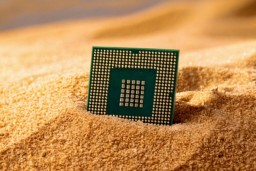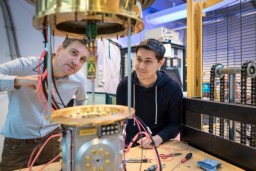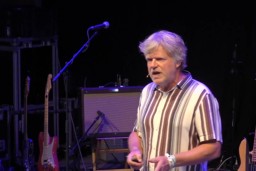 science SecurityWhy will all computers crash in 2038?It’s almost 2026. As we prepare to ring in the new year, think back to the turn of the millennium in 2000. Remember? The world was gripped by the ‘millennium bug’. Computers were expected to go haywire, stock markets to crash, planes to fall from the sky. In the end, it wasn’t so bad. What people often forget is that this was thanks to billions spent on preparation.
science SecurityWhy will all computers crash in 2038?It’s almost 2026. As we prepare to ring in the new year, think back to the turn of the millennium in 2000. Remember? The world was gripped by the ‘millennium bug’. Computers were expected to go haywire, stock markets to crash, planes to fall from the sky. In the end, it wasn’t so bad. What people often forget is that this was thanks to billions spent on preparation. science Chip TechnologyWhy light in churches looks magical, and its connection with chipsWalk into a church on a clear day, and you can feel the light change. Reds seem to glow from within, yellows land softly on stone, blues deepen the air. It looks like pure artistry, but a lot of that effect comes from something the makers never saw directly: nanoscale structure inside the glass. Himadri Sahoo, a postdoctoral researcher in the Adaptive Quantum Optics group, takes us from coloured church windows to modern photonic chips, showing how old ideas about light are still used in cutting-edge research.
science Chip TechnologyWhy light in churches looks magical, and its connection with chipsWalk into a church on a clear day, and you can feel the light change. Reds seem to glow from within, yellows land softly on stone, blues deepen the air. It looks like pure artistry, but a lot of that effect comes from something the makers never saw directly: nanoscale structure inside the glass. Himadri Sahoo, a postdoctoral researcher in the Adaptive Quantum Optics group, takes us from coloured church windows to modern photonic chips, showing how old ideas about light are still used in cutting-edge research. science Chip TechnologyHow secure is our future in an era of global tensions?As a small country, the Netherlands has historically always opened itself up to the rest of the world. In that respect, we are living in turbulent times. Trade wars between the United States, the European Union and China are creating uncertainty in both financial and goods markets. The war in Ukraine has exposed the fragility of our global supply chains. And the conflict in Gaza has revealed deep divisions within Europe. What lies ahead for the Netherlands in the coming years? We discuss the current state of affairs and the geopolitical future with Melle Scholten, political economist affiliated with the Public Administration programme at the University of Twente.
science Chip TechnologyHow secure is our future in an era of global tensions?As a small country, the Netherlands has historically always opened itself up to the rest of the world. In that respect, we are living in turbulent times. Trade wars between the United States, the European Union and China are creating uncertainty in both financial and goods markets. The war in Ukraine has exposed the fragility of our global supply chains. And the conflict in Gaza has revealed deep divisions within Europe. What lies ahead for the Netherlands in the coming years? We discuss the current state of affairs and the geopolitical future with Melle Scholten, political economist affiliated with the Public Administration programme at the University of Twente. science TechnologyHow do smart cars react so quickly?Imagine you are sitting in a self-driving car. Suddenly, someone runs across the street. In a fraction of a second, the car decides to brake. How does it do that so quickly? And could it do so even faster or with less energy, especially now that self-driving cars and autonomous vehicles rely heavily on cameras, smart sensors and AI systems?
science TechnologyHow do smart cars react so quickly?Imagine you are sitting in a self-driving car. Suddenly, someone runs across the street. In a fraction of a second, the car decides to brake. How does it do that so quickly? And could it do so even faster or with less energy, especially now that self-driving cars and autonomous vehicles rely heavily on cameras, smart sensors and AI systems? science Chip TechnologyCan the brain help us fix AI’s energy problem?Artificial Intelligence keeps growing more powerful and more energy-hungry. Could the human brain inspire a solution? In a “Universiteit van Nederland” podcast, Full Professor of Nano Electronics Wilfred van der Wiel explores whether brain-inspired hardware might change the game.
science Chip TechnologyCan the brain help us fix AI’s energy problem?Artificial Intelligence keeps growing more powerful and more energy-hungry. Could the human brain inspire a solution? In a “Universiteit van Nederland” podcast, Full Professor of Nano Electronics Wilfred van der Wiel explores whether brain-inspired hardware might change the game.
 science Chip TechnologyWhat if chips could last a lifetime without a battery?From phones, cars, and watches to bridges and greenhouses: chips are everywhere. But what if they never needed a battery again? At the University of Twente, Assistant Professor Harijot Singh Bindra, an expert in integrated circuit design, is pushing chip technology to new limits, making it smarter, more powerful and far more sustainable.
science Chip TechnologyWhat if chips could last a lifetime without a battery?From phones, cars, and watches to bridges and greenhouses: chips are everywhere. But what if they never needed a battery again? At the University of Twente, Assistant Professor Harijot Singh Bindra, an expert in integrated circuit design, is pushing chip technology to new limits, making it smarter, more powerful and far more sustainable. science TechnologyShould I be worried about how much energy AI uses?You ask ChatGPT to rewrite a paragraph, get Spotify to generate a new playlist, or have Midjourney create an image for your presentation. Super convenient! In just a few seconds, you get exactly what you need. But behind these seemingly simple actions, massive data centres around the world are running at full capacity. Artificial Intelligence (AI) consumes a great deal of energy. But how much, exactly? And could it be done smarter? Researchers at the University of Twente believe it can.
science TechnologyShould I be worried about how much energy AI uses?You ask ChatGPT to rewrite a paragraph, get Spotify to generate a new playlist, or have Midjourney create an image for your presentation. Super convenient! In just a few seconds, you get exactly what you need. But behind these seemingly simple actions, massive data centres around the world are running at full capacity. Artificial Intelligence (AI) consumes a great deal of energy. But how much, exactly? And could it be done smarter? Researchers at the University of Twente believe it can. science Chip TechnologyDid you know that every smartphone contains an invention from Twente?Every time you use your smartphone – whether it’s to open an app, send a message, or watch a video – you’re benefitting from a remarkable invention from Twente. At the core of the technology enabling modern smartphones lies the Nauta circuit, a design by Professor Bram Nauta of the University of Twente. This innovation has made it possible for your phone to work quickly and efficiently. But what exactly is this circuit, how does it work, and why is it so important?
science Chip TechnologyDid you know that every smartphone contains an invention from Twente?Every time you use your smartphone – whether it’s to open an app, send a message, or watch a video – you’re benefitting from a remarkable invention from Twente. At the core of the technology enabling modern smartphones lies the Nauta circuit, a design by Professor Bram Nauta of the University of Twente. This innovation has made it possible for your phone to work quickly and efficiently. But what exactly is this circuit, how does it work, and why is it so important? science Chip TechnologyThis flow sensor could change vertical farming and data centresUT PhD candidate Thomas Leigh Hackett has devised a way to improve the air speed measurements of a so-called flow sensor by as much as 511%. This could lead to better sensors for horticulture and better air flow in data centers.
science Chip TechnologyThis flow sensor could change vertical farming and data centresUT PhD candidate Thomas Leigh Hackett has devised a way to improve the air speed measurements of a so-called flow sensor by as much as 511%. This could lead to better sensors for horticulture and better air flow in data centers. science Chip TechnologyFrom sand to smartphoneThe smartphone in your pocket and other electronic devices are packed with microchips. With a huge demand for smartphones, computers, and other smart technologies, there is a global shortage of these chips. Production processes simply cannot keep pace with the immense demand. But why does making a computer chip take so long?
science Chip TechnologyFrom sand to smartphoneThe smartphone in your pocket and other electronic devices are packed with microchips. With a huge demand for smartphones, computers, and other smart technologies, there is a global shortage of these chips. Production processes simply cannot keep pace with the immense demand. But why does making a computer chip take so long? science HealthHow mini hearts-on-chips can save millionsEvery year, cardiovascular disease impacts over 126 million people worldwide. In the quest for effective treatments, researchers are tirelessly working to develop better solutions. However, current animal and test-tube models often fall short in predictive accuracy. Prof. Dr. Robert Passier is at the forefront of this research, combining advanced technologies to create innovative human heart models that function like real human hearts. This groundbreaking invention could lead to safer medications and reduced reliance on animal testing in research.
science HealthHow mini hearts-on-chips can save millionsEvery year, cardiovascular disease impacts over 126 million people worldwide. In the quest for effective treatments, researchers are tirelessly working to develop better solutions. However, current animal and test-tube models often fall short in predictive accuracy. Prof. Dr. Robert Passier is at the forefront of this research, combining advanced technologies to create innovative human heart models that function like real human hearts. This groundbreaking invention could lead to safer medications and reduced reliance on animal testing in research. science Chip TechnologyOur tech is a huge energy guzzler, here's how we're changing itIf we continue like this, ICT applications will account for no less than twenty percent of our total electricity consumption by 2030. Data centers, AI, the many millions of questions we ask Google every day... It takes an enormous amount of computing power and therefore energy. This can and must change, agrees Professor Wilfred van der Wiel of the University of Twente.
science Chip TechnologyOur tech is a huge energy guzzler, here's how we're changing itIf we continue like this, ICT applications will account for no less than twenty percent of our total electricity consumption by 2030. Data centers, AI, the many millions of questions we ask Google every day... It takes an enormous amount of computing power and therefore energy. This can and must change, agrees Professor Wilfred van der Wiel of the University of Twente. science Chip TechnologyMini-lectures Zwarte Cross, episode 3: Chips, digital tastemakers from Dutch soilThe Universitent at the Zwarte Cross, the largest festival in the Netherlands, has been a successful concept for years. In this summer series you can watch the mini-lectures again. In episode 3, Guus Rijnders talks about computer chips.
science Chip TechnologyMini-lectures Zwarte Cross, episode 3: Chips, digital tastemakers from Dutch soilThe Universitent at the Zwarte Cross, the largest festival in the Netherlands, has been a successful concept for years. In this summer series you can watch the mini-lectures again. In episode 3, Guus Rijnders talks about computer chips.